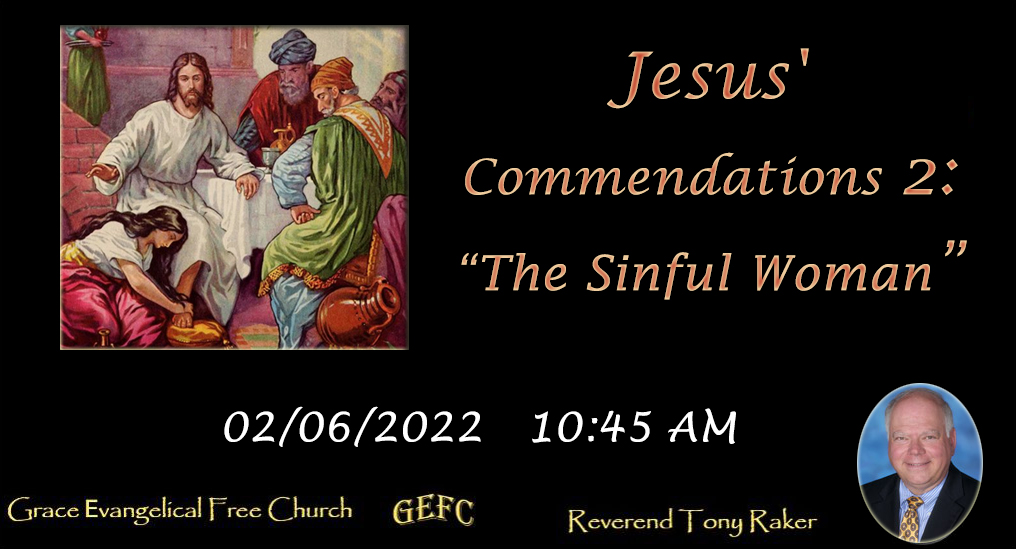
Jesus’ Commendations 2: The Sinful Woman
This series reviews instances where Jesus commended either individuals or groups, clarifying circumstances, identifying the heart intent of all and the impact on us today.
- Contextual/Comparison: God keeps His Word: God continually uses His Word. This study concerns “a woman who had lived a sinful life” (Scripture portion: Luke 7:36-50; Commendation: 44-48). We are all sinners, without exception: we were born that way (Psalm 51:5, 58:3). Being sinners by nature we have all committed sin (Isaiah 53:6; Ecclesiastes 7:20; Romans 3:23; and are guilty before God (Ezekiel 18:4; Romans 6:23; 1 John 1:8-10). Notice three aspects we should consider:
- THE SIN THAT ENSLAVED HER
She was a great sinner – v. 47 tells us her sins were “many”. From the description it would seem she was a prostitute. Now for every woman who is guilty of this sin some man is involved – perhaps many, in fact – and the tragedy is that usually the man goes free – but not for always. God will not let him go free (see the progression from Galatians 6:7, to Revelation 21:8). This poor woman was completely enslaved by her sin; her condition is described in John 8:34, and the consequences of her sin are described in James 1:15. Your sin may not be along this line, but may be dishonesty, hypocrisy or some secret jealousy or pride. The saving thing about her is that she knew she was a sinner, and it was not necessary to convince her that she needed salvation. She hated her sin. Of course she did! No fallen man or woman, no alcoholic, no one enslaved by sin ever intended to become enslaved. But notice the second thing we are told about her:
- THE FAITH THAT ENCOURAGED HER
She had a great faith. The natural tendency is to feel too bad to come to the holy, sinless Savior; but this woman believed that if she came He would welcome, pardon and deliver her. She was absolutely right (Matthew 9:13; Luke 15:2; 19:7, and see what it says at the end of Luke 7:34). How grateful we must all be for 1Timothy 1:15! What, then, did the woman do? From vv. 37, 38 notice five things the grace of God led her to do:
- She KNEW. Verse 37 tells us this. She knew that Jesus was nearby and accessible; and He is near you now (Acts 17:27-28)
- She BROUGHT. Verse 37 tells us that she brought to her Lord an alabaster box of ointment, which was the token of the love she was to pour out before Him. Have you some token of your love for Him?
- She WEPT. Verse 38 tells us this, and here we have the indication of her contrition, her sorrow and her repentance (Psalm 51:17)
- She KNELT. She must have done, in order to wash His feet. Here we have a picture of real humility – a poor, sinful woman prostrate at the feet of her Lord, probably praying in the words of Psalm 51:9-10.
- She KISSED. Verse 38 emphasizes this. How wonderful that our Lord should allow this sinful woman to kiss His feet, and how wonderful that we may come to Him just as she came to Him! The same wonderful, loving Lord who received and pardoned this sinful woman will receive and pardon anyone who comes to Him in humility, penitence, simple trust and with the desire and plea for His acceptance and blessing. Finally, notice:
Luke 7:48: “And he said to her, “Your sins are forgiven.”
- Grammatical Usage: “sins” or in the Greek, “hamartia” means, “multiple, self-originated ethical failure”; “forgiven” or “aphiémi” meaning, “release; remit; cancel”.
- Literal Interpretation: Your ethical failures are canceled.
- THE LOVE THAT ENCOMPASSED HER
This is brought before us in a most touching way. Read Luke 7:44-50 carefully, and notice the following four points:
- The Lord’s Approval. 44-46 bring before us our Lord’s loving and gracious words of commendation. How sweet those words must have been to the woman! She would feel overwhelmed with the sense of His deep understanding, His tender love and His gracious acceptance of her, despite her sinfulness. And the Savior is still willing to receive us if only we will come to Him in our deep need
- The Lord’s Forgiveness. Verse 47 is a New Testament illustration of Isaiah 1:18. Her sins were literally as scarlet and crimson, but as she fell at the feet of her Lord and Sin-bearer she was made white as snow (Psalm 51:7). The same gracious gift of pardon is offered to all people, everywhere (Acts 13:38-39)
- The Lord’s Assurance. This is brought before us in 48. Could she ever again have any doubt about the full forgiveness that the Lord had given her? She had His sure word upon which to rest, and you and I have the same (1 John 2:12)
- The Lord’s Commission. 50 tells us that the Lord said to her, “Go….” Yes, she was to go back to her friends, to her home, back to tell others of the wonderful grace of her Lord. And as she went on this journey, back into a new life of fellowship with and service for her Lord, she was to experience Philippians 4:7.
- Conclusion: Wonderful Savior! Wonderful salvation! How do you fit into this picture?
